Vanity Fair, August 1915
THE SO-CALLED PLEASURES OF CONEY ISLAND
With a Few Undignified Sketches by Ethel Plummer
Narrative by P. Brooke-Haven
IN the days of the Spanish Inquisition one of the assistant torturers was chatting with Torquemada during a matinée performance in the deepest dungeon beneath the castle moat.
“We aren’t doing so well as we used to,” said this worthy fellow. “I’m not kept busy at all nowadays,—not what I call busy.”
“I think,” said Torquemada, “that the supply of heretics must be giving out.”
“It isn’t that,” replied the other. “The trouble is that our methods are all wrong. What happens, for instance, if we want to put a fellow on the rack? Why, we go out and arrest him, and try him in prison first, and all that. What we ought to do is to charge a small admission fee, change the name of the rack to Stretching the Stretch or something, and before you knew where you were we should be turning them away.”
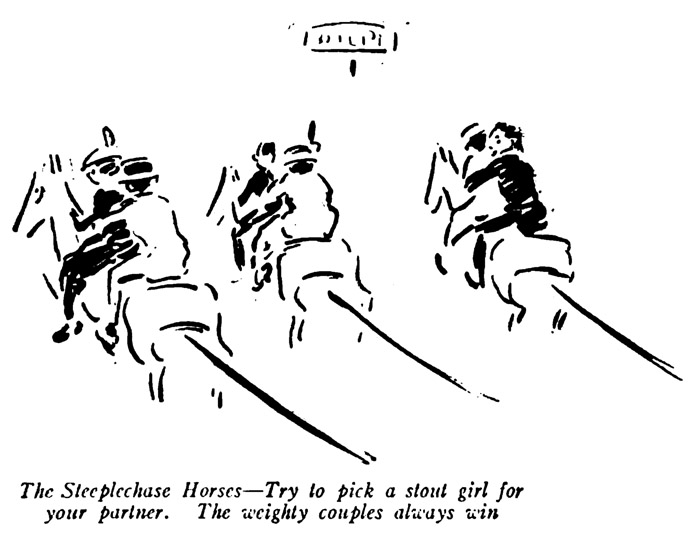
Well, Torquemada paid no attention to the man, partly because he himself was a conservative in his views and partly because it would have been beneath the dignity of the Head of the Inquisition to accept advice from an underling: and look at the result! Who ever hears of the Spanish Inquisition nowadays? What dividends does it pay? It has failed, simply because it was run without any understanding of the first principles of human nature.
Centuries later, along came Coney Island, run on the lines suggested by the above-mentioned thinker, and it is doing great business.
The principle at the bottom of Coney Island’s success is the eminently sound one that what would be a brutal assault, if administered gratis, becomes a rollicking pleasure, when charged for at the rate of ten cents per assault.
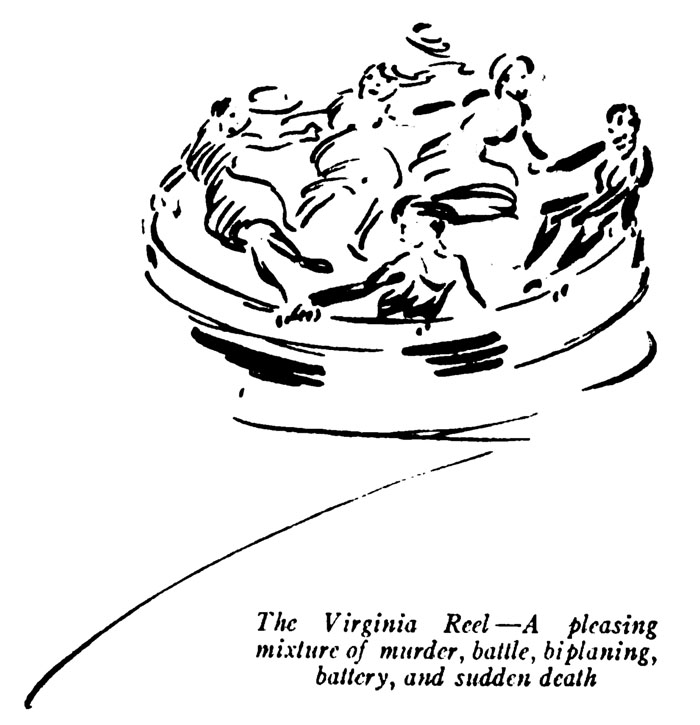
Suppose somebody laid hands upon you and put you in a large round tub. Suppose he then proceeded to send the tub spinning down an incline so arranged that at intervals of a few feet it spun round and bumped violently into something. Next day he would hear from your lawyer. But at Coney Island you jump into the Virginia Reel, and enjoy it. You have to enjoy it, because you have paid good money to do so.
To one who, like myself, has never invented anything more elaborate than an excuse for getting out of a dull dinner party, the most amazing thing about Coney Island is the apparently effortless way in which those in charge think up new attractions every year. I picture them as rather grim, melancholy men. In early life they have had some disappointment, and this has soured them. They do not love their species, but the law prevents their revenging themselves on mankind by any simple and direct process, so they have to invent Attractions. When they devise something which must inevitably produce dyspepsia, nervous breakdowns, and heart failure in the victim, they are happy.
They meet at a special club of their own.
“The lawyers got away with all my money during my minority,” says one, “but I have invented an attraction which jerks you up and sideways at the same time and squirts water in your face.”
“My wife eloped with the chauffeur in the summer of ’93,” says the other, “but look at the new one I have invented. You pay ten cents and drop through a trap-door onto a lot of spikes.”
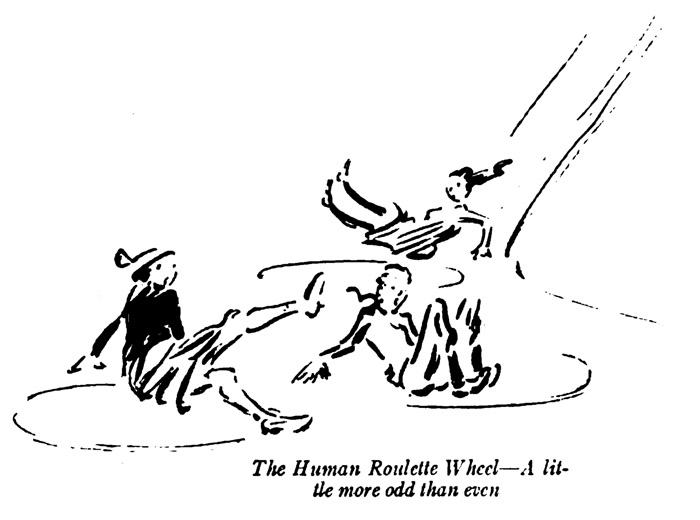
Being in America, Coney Island is thought a little vulgar. If it were in France, we should have had writers pointing out how essentially refined the Tickler and the Human Roulette Wheel were, and with what abandon and polish the French populace took its pleasures.
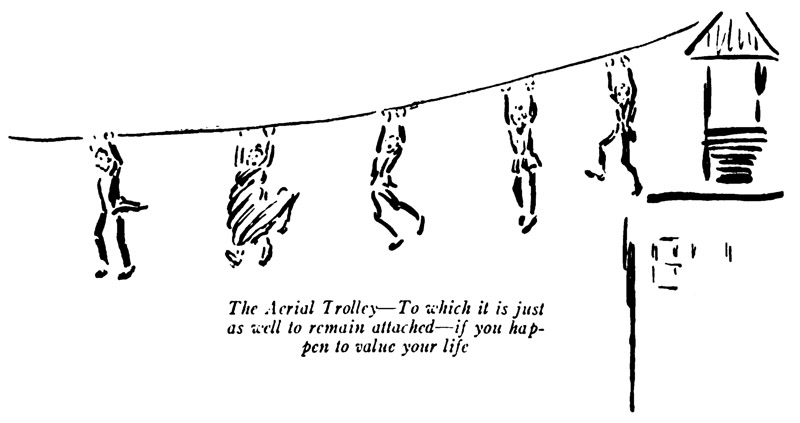
To the thinking man the great charm of Coney Island is the feeling of confidence it gives that the heart of the nation is sound and that, though we may be unprepared for war, we could nevertheless be depended on to render a good account of ourselves, should the necessity arise. We may have a small army and navy, but it would be a rash power that would dare to set foot on the soil of a country whose inhabitants can consume hot dogs and ice-cream cones, wash them down with iced beer, and then go off and submit smiling to the Aerial Slide and the Barrel of Love. We should like to see a regiment of Uhlans tackle the Virginia Reel! They would have the white flag out before the tub had done its second bump.
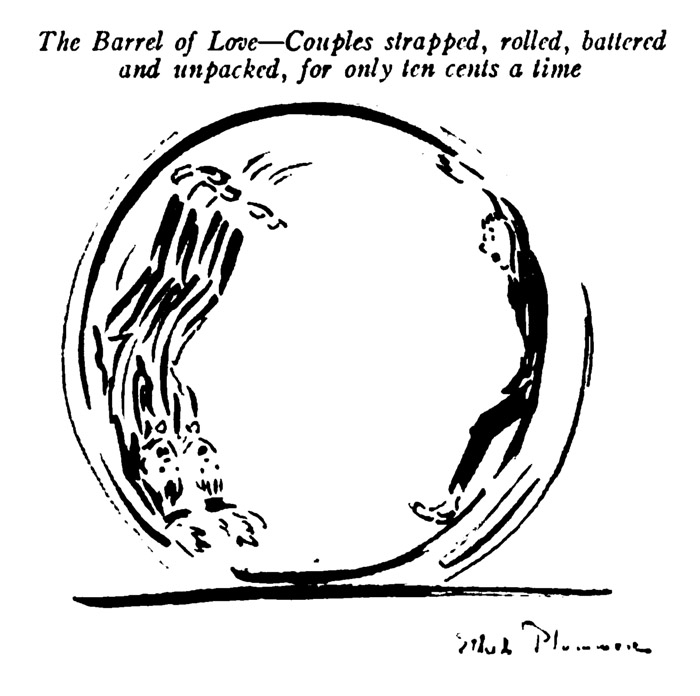
Again, Coney Island’s system of combination tickets might solve Broadway’s problem of theatrical depression. Think of central offices where one could buy a combination ticket for all the theatres! Theatre going would cease to be a gamble. For example, if you didn’t like the play at the Gaiety, you could leave and go to the Astor, and so on till you picked a winner.
Before I forget. It seems that the explosion from the neighborhood of the kitchen, which I heard as I was writing my last paragraph, was the cook having a few difficulties with the oven. My wife reports that our faithful Swede, underestimating the volume of gas in the stove, set her front hair and part of her dress on fire, was exploded to the ceiling, and is now in hysterics. I cannot conclude an article on Coney Island without suggesting this brand-new idea to the promoters. I look forward to seeing, on my next visit there, the great new attraction, The Oven of Joy. The idea is sound. It contains all the elements of a genuine Coney Island success. It makes a lot of noise; it throws you in the air, and it nearly kills you. Price ten cents.
 Madame Eulalie’s Rare Plums
Madame Eulalie’s Rare Plums